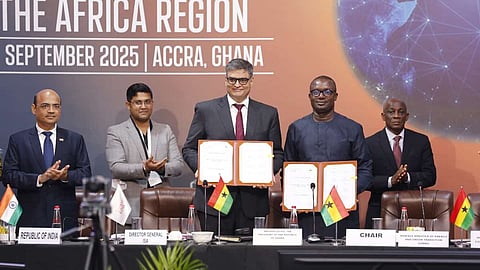

New Delhi: The International Solar Alliance (ISA) has confirmed that its Africa Solar Facility (ASF) will become operational before the end of 2025, marking a fresh milestone in the continent’s renewable energy transition. The facility, to be managed by Africa50, was first announced in late 2024 with a capitalisation of USD 200 million in catalytic finance aimed at de-risking solar projects and mobilising over 20 times that amount in private investment.
Follow Energy Watch on X
At the Seventh Meeting of the ISA Regional Committee for Africa, Nigeria’s sovereign wealth fund (NSIA) has pledged USD 100–150 million to the facility, further strengthening its financial base, said the ISA in a statement on Friday.
Speaking at the Seventh Meeting of the ISA Regional Committee for Africa in Accra, Ghana’s Energy and Green Transition Minister John Abdulai Jinapor emphasised the urgency of scaling solar. “About 600 million people in Africa do not have access to electricity. Africa represents 17 percent of the world’s population, yet consumes just 4 percent of the world’s energy. Bridging this gap is our collective opportunity: transforming pipeline projects into bankable ones, providing low-risk premiums, and attracting greater private capital,” he said.
Three countries — Ghana, Nigeria and The Gambia — formalised Country Partnership Frameworks (CPFs) with ISA to align solar policy with national energy goals. These frameworks will prioritise solar rooftops, community mini-grids, agriculture-driven applications, and institutional capacity building.
The conclave also spotlighted agriculture-linked applications. ISA noted that solar-powered irrigation and cold storage can help reduce Africa’s USD 400 billion annual food import bill, create rural jobs and improve resilience. “Expanding solar-powered irrigation and cold storage could help reduce Africa's annual food import bill, create rural jobs, and strengthen climate resilience,” the statement said.
ISA has aligned its Africa strategy with Mission 300, an initiative backed by USD 48 billion in concessional funding to electrify 300 million Africans. UN SEforALL chief Damilola Ogunbiyi underscored the importance of domestic investment. “The average African, even when connected, uses about 400 kilowatt-hours of energy compared to 13,000 kilowatt-hours in the United States. This is unjust and cannot be part of our transition story. Africa must invest in Africa. Sovereign wealth institutes, pension funds, and local banks hold the capital to fund distributed renewable energy projects,” she said.
ISA also announced initiatives to advance AI-driven tools and digital twins of power distribution systems. These technologies, the alliance said, will help utilities map assets, identify inefficiencies, improve dispatch of rooftop and utility-scale solar, and lower costs while enhancing reliability.
In his inaugural address, ISA Director General Ashish Khanna emphasised a shift from “ambition to action.” “ISA's strategy, 'Moving from Ambition to Action,' aims to establish implementation partnerships, innovate financing methods, and strengthen local capacities. Our goal is to empower countries to develop their own solutions,” he said.
Ghana’s economic advisor Seth Terkper echoed this, noting, “Africa has an extraordinary opportunity to harness its abundant solar resources to drive economic growth, create jobs, and improve energy access for millions.”
Follow Energy Watch on LinkedIN
India, France, and the UN expressed strong backing for Africa’s solar ambitions. Indian High Commissioner Manish Gupta said, “India’s vision of ‘One Sun, One World, One Grid’ aligns with energy transition strategies aimed at providing clean and reliable energy to millions.” France’s ambassador Jules Armand Beaussieux added that solar was essential not just for climate action but also for industrial development, energy security, and job creation.
